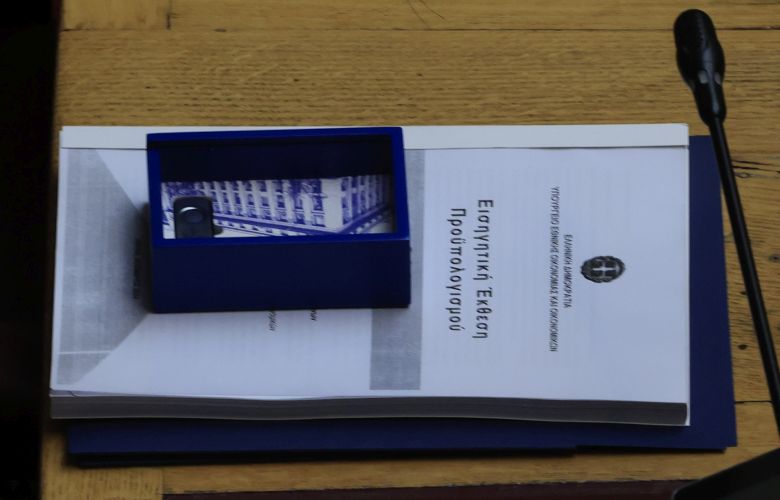The medium-term budget plan was also approved
OR European Commission welcomes Greece’s draft 2025 budget and medium-term fiscal plan, according to the European Semester autumn package released today – the first under the new economic governance framework.
Presenting the assessment for them budgets, Economy Commissioner Paolo Gentiloni reported that of the 20 eurozone member states, 17 budget plans for 2025 were submitted (Austria, Belgium and Spain did not submit plans). Of these, eight countries: Greece, Cyprus, Croatia, France, Italy, Latvia, Slovenia and Slovakia, are considered to be in compliance with the fiscal recommendations, as net expenditure growth is within the ceilings.
On the other hand, according to the Commission, the budget plans of seven countries: Estonia, Germany, Finland and Ireland are not fully in line with the fiscal recommendations, as there is a net increase in spending that exceeds the ceilings.
Luxembourg, Malta and Portugal are not phasing out energy measures until winter 2024-2025. The Netherlands is not in line with the fiscal recommendations, as net spending is projected above the ceiling and above the threshold for the control account, while Lithuania’s draft budget submitted by the previous government is at risk of not being in line with the recommendations, because net costs exceed the cap.
MEDIUM TERM PLANS
With the new economic governance framework, all Member States submit to the Commission medium-term reform and investment plans to address common EU priorities and challenges. Fiscal trajectories are now tailored to each Member State and room for maneuver has been created for investment. They are spread over a period of four years, which can be extended to seven years, in exchange for more reforms.
The Commission completed its assessment of 21 of the 22 long-term plans submitted. Of the 21 plans, the Commission assessed 20 as meeting the requirements of the new framework and setting out a credible fiscal path to ensure that the debt level of the respective Member States is put on a sustainable downward path or kept at prudent levels. This concerns the following Member States: Greece, Cyprus, Croatia, Czech Republic, Denmark, Estonia, Finland, France, Ireland, Italy, Latvia, Luxembourg, Malta, Poland, Portugal, Romania, Slovakia, Slovenia, Spain and Sweden. For these Member States, the Commission recommends to the Council to approve the course of the net costs included in the plans in question, it was pointed out in the EIA.
In the case of the Netherlands, the Commission proposes to the Council to recommend a path of net expenditure in line with the technical information forwarded by the Commission in June.
The Commission is still assessing Hungary’s medium-term plan.
For five countries (France, Italy, Spain, Finland and Romania), the path of net expenditure is based on an extension of the adjustment period from four to seven years. This extension is supported by a number of reform and investment commitments included in the plans, the Commission underlines.
EIGHT COUNTRIES IN EXCESSIVE DEFICIT PROCESS
Among the seven countries that opted for a seven-year fiscal adjustment period, three (France, Italy, Romania) are in an excessive deficit process. The Commission stresses that their plans include significant commitments to reform and investment.
As of June 2024, eight EU countries are in excessive deficit: France, Italy, Belgium, Hungary, Malta, Poland, Romania and Slovakia. These countries must take corrective measures to comply with European Union fiscal rules in the future or face fines. The new Stability Pact provides in principle financial sanctions of 0.1% of GDP per year for countries that do not implement the imposed corrections.
France, the EU’s second-largest economy, stands out with the second-highest public deficit expected in the EU this year, at 6.2% of GDP, behind Romania (8%), far from the 3% ceiling set by allowed by EU rules. Paris aims to reduce its deficit to 5% of GDP in 2025, before returning below the “threshold” in 2029 to 2.8%. The fiscal consolidation effort announced by France’s new finance minister, Antoine Armand, corresponds to 60 billion euros for 2025, which will come mainly through spending cuts and new taxes.
POSTMEMORIAL SURVEILLANCE REPORTS
The European Commission published the post-memorandum surveillance reports, which assess the economic, fiscal and financial situation of the eurozone countries that had entered into a financial assistance program (Greece, Ireland, Portugal, Cyprus and Spain), focusing on their ability to repay. The Commission’s report concludes that all five Member States maintain their debt repayment capacity.








